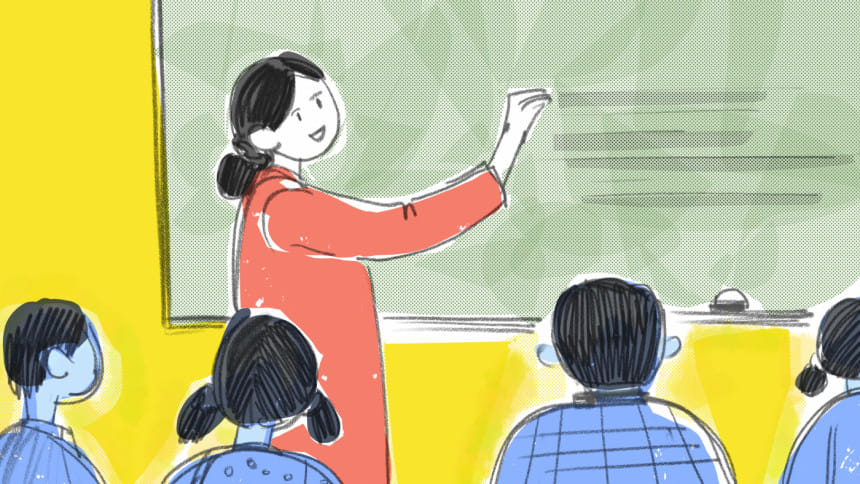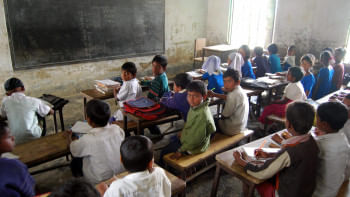Teachers can make the new curriculum work. But are they paid enough?

This year, Bangladesh enters the era of "competency-based education," following the adoption of a new curriculum in most classes at Bangla medium schools countrywide. For those who have had a chance to look at the ins and outs of this curriculum, this change should be exciting. But with the challenges of training teachers, onboarding parents, and ensuring consistency in quality, the feelings surrounding the new curriculum can best be described as excitement of a nervous kind.
One common thread in every conversation and discussion on this competency-based curriculum is that "it all hinges on the teachers." This makes sense because it will be teachers who will deliver lessons on a day-to-day basis following the guidelines and theories developed by educationists and researchers in faraway places. Teachers will be the ones answering the questions parents throw at them regarding the lack of traditional exams. Teachers will also have to learn a brand new method of evaluating students and explain these evaluations to confused students and parents.
Yet, with all the talk surrounding the new curriculum and the role of teachers in its success, a crucial element has been absent from the conversation. Lest we forget, it was less than six months ago that many of these teachers had gone on hunger strikes demanding the nationalisation of secondary education and better pay for themselves.
In Bangladesh, primary education is nationalised, meaning that the salaries of government-run primary school teachers are paid by the government according to the national pay scale. Teachers at the primary level are paid according to the 13th grade of the scale, giving them a basic salary between Tk 11,000 and Tk 26,590.
For secondary school teachers, it's a bit more complicated as secondary education is not nationalised in Bangladesh. According to Bangladesh Education Statistics 2022, there are 21,003 secondary schools in the country. Only 691 of them are public schools. Among the rest, most rely on the government's MPO (monthly pay order) system, through which the government pays teachers' basic salary and additional allowances.
The teachers who were on strike were from schools under the MPO system, and their demand was for their pay structure to be raised to match that of government school teachers.
Teachers in Bangladesh's government-run secondary schools are paid according to the 10th grade of the national pay scale, with basics between Tk 16,000 and Tk 38,640. Government school teachers get 45 percent of this basic as house rent, 100 percent of the basic as bonus during festivals, and Tk 1,500 as medical allowance. On the other hand, teachers under MPO only get Tk 1,000 as house rent, Tk 500 as medical allowance, and just 25 percent of their basic as festival allowance on top of their basic. This second group of teachers—who make up by far the largest percentage of secondary school teachers across the country—are the ones who went on strike in 2023.
Much can be said about whether these amounts are sufficient, given the rising cost of living in the country, and whether the salary breakdown figures are high enough to motivate talented individuals to take up the pressure-intensive career of a teacher. But let's put all of that aside to simply ask ourselves if what is being asked of teachers in 2024, given the scope of their pay, is fair.
This is also not the first time a flashy new curriculum has been introduced in Bangladesh, with the ambition of changing education for the better—forever.
What is being asked is for them to commit to a total upheaval of their teaching practices. National Curriculum and Textbook Board (NCTB) officials have admitted that the shift to the new curriculum constitutes a transformation of the whole education system. The textbooks have been changed, not only in terms of content but also in how they are structured. But that may just be the least of it, as changes are being implemented in teaching-learning methods, as well as in evaluation.
Imagine the case of a teacher with a decade or two of experience, who has struggled with meagre pay for years, to presently be able to rely on their experience to streamline classroom activities. This teacher will now have to throw most of their know-how out the window. But things aren't much simpler for teachers starting their career at the bottom end of the pay scale, as nothing they grew up learning in school resembles this new system being touted by the NCTB. Teachers are being asked to adjust to and deliver these mammoth changes on the back of mere weeks of training, much of which was also delayed and fractured due to the national election in January and its preceding buildup.
Many, including the former education minister, have expressed concern that teachers who want to continue running coaching businesses are the ones opposing this new curriculum. This is a valid concern since the new curriculum, if implemented correctly, will teach students to learn by themselves and slowly phase out the necessity of coaching classes and guide books. Yet, a deeper concern should be to examine why teachers feel desperate to continue running coaching centres. Why is it that earning by contributing to guide books is vital to teachers?
This is also not the first time a flashy new curriculum has been introduced in Bangladesh, with the ambition of changing education for the better—forever. Readers may recall the days of "creative questions" being introduced around 2012, when similar promises of ending coaching businesses and diminishing the need for guide books were made. Yet, within years, teachers fell into a predictable pattern of question-making, running coaching centres, and coming out with guide books. Nothing really changed. One might attribute this stagnation to the stubbornness of teachers. But once again, it should not be ignored that this stubbornness is fueled by need—the need for better, more respectable pay.
There are few workplaces in the world where employees on unsatisfactory pay can be asked to change almost every element of their workflow overnight. The only way this can be enforced is if the employees have no other option but to comply—no better alternative; no way out other than risking their employment and hence facing abject hunger if they refuse to implement the changes. This, though, should not be the mindset with which teachers jump into this new era of education in Bangladesh. This is the sort of challenge that needs to be met with enthusiasm from teachers who are happy, unworried, and well taken care of. Otherwise, this will soon become the sort of challenge that cannot be countered by our education sector, as we have seen in the past.
Azmin Azran is a journalist at The Daily Star.
Views expressed in this article are the author's own.
Follow The Daily Star Opinion on Facebook for the latest opinions, commentaries and analyses by experts and professionals. To contribute your article or letter to The Daily Star Opinion, see our guidelines for submission.


 For all latest news, follow The Daily Star's Google News channel.
For all latest news, follow The Daily Star's Google News channel. 










Comments